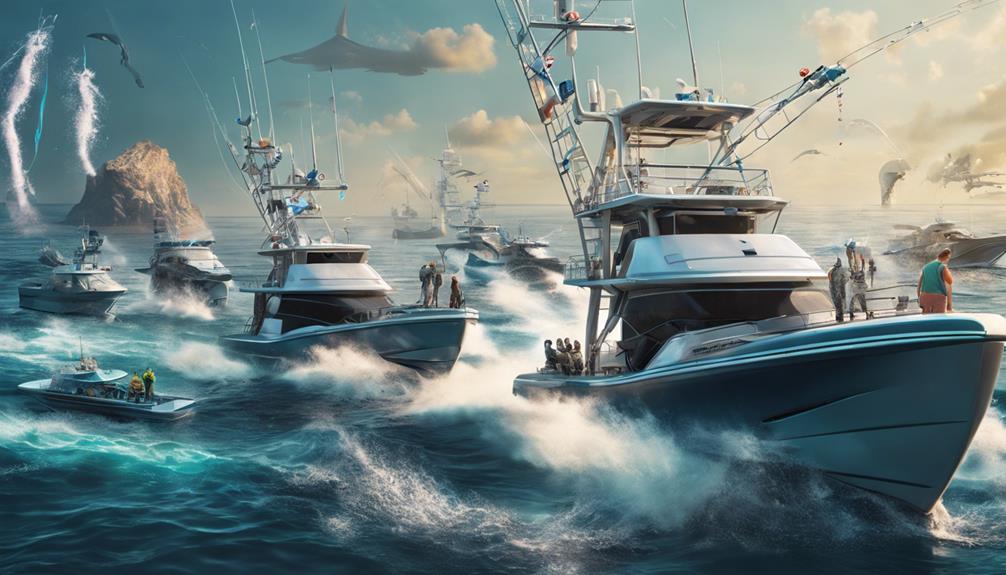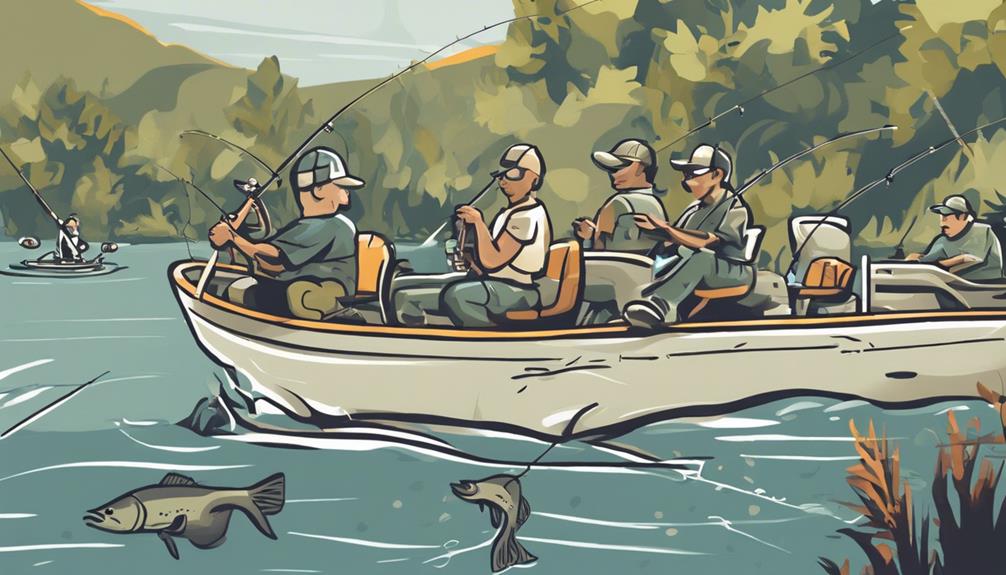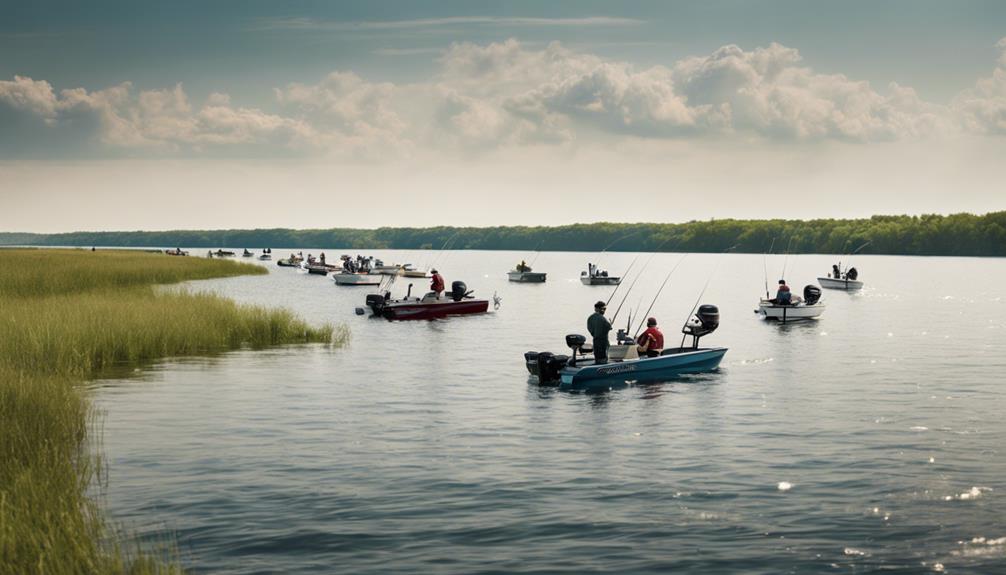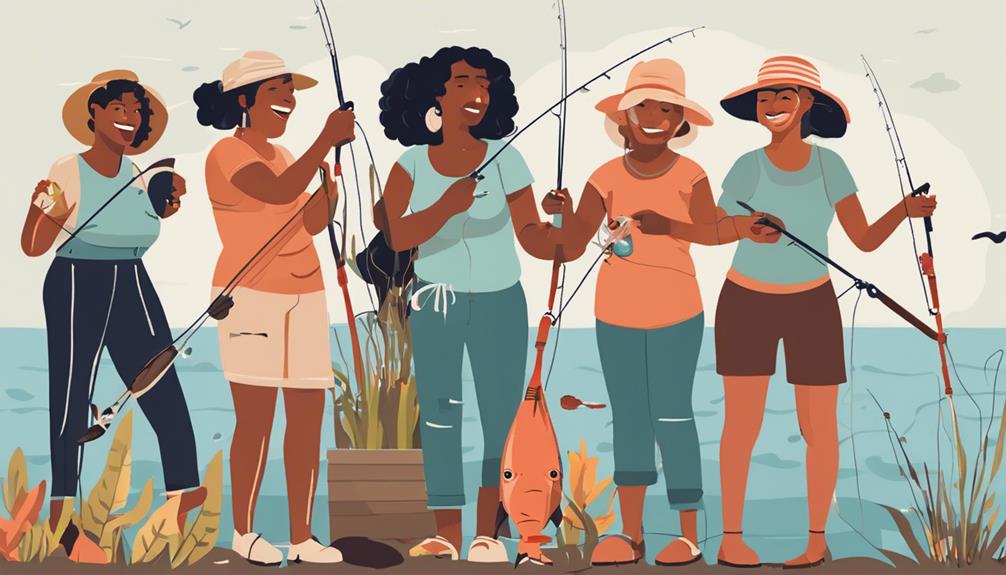In the future of deep sea fishing tournaments, expect cutting-edge sonar systems for tracking, AI algorithms for real-time fish data, and VR simulations for immersive experiences. Sustainable practices will focus on ethical fishing methods, conservation efforts, and educating anglers. Globalization will bring international rivalries, sponsorships, and cultural exchanges. Female participation will grow, adding diversity. Prize structures will offer innovative rewards beyond cash. Inclusivity initiatives will broaden participation and representation. The landscape is evolving with technology, sustainability, diversity, and innovation, shaping a promising future for competitive angling. Additional insights await on the horizon of deep sea fishing tournaments.
Emerging Technologies in Tournaments
Exploring the use of cutting-edge sonar systems has revolutionized the efficiency of tracking fish populations in deep sea fishing tournaments. These sonar systems, equipped with advanced AI algorithms, provide real-time data on fish movements and populations. By integrating AI technology, tournaments have been able to implement more accurate judging processes. AI-assisted judging systems analyze various factors such as fish size, species, and quantity, ensuring fair competition and adherence to regulations.
Virtual reality experiences have also started to reshape the landscape of deep sea fishing tournaments. Participants can now immerse themselves in virtual simulations that replicate the deep sea environment, allowing them to practice different fishing techniques and strategies. This technology not only enhances the skills of contestants but also provides a unique and engaging experience for spectators.
Moreover, virtual reality platforms are being utilized for educational purposes in tournaments. They offer interactive lessons on sustainable fishing practices, marine conservation, and species identification. This immersive approach not only educates participants but also instills a sense of responsibility towards the marine ecosystem.
Sustainable Practices in Competitions
The shift towards sustainable practices in deep sea fishing tournaments necessitates a comprehensive reassessment of competition regulations and operational methodologies. Sustainable practices in competitions are crucial to ensure the long-term health of marine ecosystems and fish populations. Ethical fishing practices, such as catch-and-release techniques, size limits, and gear restrictions, play a vital role in promoting sustainability in tournaments.
Implementing sustainable practices involves setting strict guidelines for participants regarding the species that can be targeted, the size and quantity of fish that can be caught, and the gear that can be used. By encouraging responsible fishing practices, tournaments can help reduce overfishing and minimize the impact on non-target species.
Furthermore, promoting ethical fishing practices not only benefits the environment but also enhances the overall reputation of deep sea fishing tournaments. Participants and spectators are increasingly valuing events that prioritize sustainability and conservation efforts. Embracing sustainable practices can attract a more environmentally conscious audience and boost the credibility of competitions in the eyes of conservation organizations and regulatory bodies.
Globalization of Fishing Events
The globalization of fishing events is significantly reshaping the landscape of deep sea angling competitions. This phenomenon is driven by a growing interest in international rivalries, where anglers from different countries compete to showcase their skills on a global platform.
The following points highlight the key aspects of this transformation:
- International Rivalries: As fishing events expand across borders, the competition intensifies, fueled by the pride of nations. Anglers now strive not only for personal glory but also to secure victories for their countries. This dynamic adds a new level of excitement and prestige to deep sea fishing tournaments, drawing in a wider audience and increasing the competitiveness of the sport.
- Sponsorship Opportunities: With the globalization of fishing events, new sponsorship opportunities have emerged. Companies are eager to invest in these high-profile competitions to gain exposure in diverse markets. This influx of sponsorships not only boosts the prize pools for participants but also elevates the overall production quality of the tournaments, leading to enhanced viewer experiences.
- Cultural Exchange: Globalization in fishing events facilitates cultural exchange among participants and spectators. Anglers get the chance to interact with peers from different backgrounds, sharing knowledge and techniques. This cross-pollination of ideas enriches the sport and fosters a sense of camaraderie among the global angling community.
Women's Role in Fishing Tournaments
As female participation in fishing tournaments continues to gain momentum, their presence in the deep sea angling community is becoming increasingly prominent. Female representation in fishing tournaments has been historically low, but efforts towards gender equality in the sport are progressively making an impact. The inclusion of women in fishing tournaments not only diversifies the participant pool but also fosters a more inclusive and welcoming environment for all anglers.
Studies have shown that female anglers bring a unique perspective to fishing tournaments, often excelling in certain aspects of the sport. Their attention to detail, patience, and strategic thinking can provide a competitive edge in deep sea angling. By encouraging more women to participate in fishing tournaments, organizers aren't only promoting gender equality but also enriching the overall fishing experience for everyone involved.
To further enhance female representation in fishing tournaments, initiatives such as women-specific angling workshops, mentorship programs, and dedicated fishing events have been implemented. These efforts aim to empower women in the fishing community, break down traditional gender barriers, and create a more inclusive space for all anglers to thrive.
Evolution of Prize Structures
With the evolution of fishing tournament prize structures, a shift towards greater competitiveness and sustainability is observed. Prize structures are adapting to meet the changing demands of participants and stakeholders. Here are some key trends:
- Innovative Rewards: Fishing tournaments are moving beyond traditional cash prizes and trophies. Organizers are incorporating unique rewards such as sponsored fishing gear, exclusive fishing trips, and even opportunities to participate in conservation efforts. These innovative rewards not only attract more participants but also promote sustainable fishing practices.
- Sponsorship Partnerships: Collaboration with sponsors has become integral to the prize structures of modern fishing tournaments. Companies looking to reach a specific target audience are keen to partner with tournaments, providing products or services as prizes. These partnerships not only enhance the overall prize pool but also help in promoting environmental awareness and conservation initiatives.
- Diversification of Prizes: To cater to a wider range of participants, fishing tournaments are diversifying their prize offerings. Apart from prizes for the largest catch, there are now categories for the most unique species caught, the youngest angler, or even the most environmentally conscious participant. This diversification ensures that all participants have a chance to win something valuable, encouraging greater inclusivity and participation in tournaments.
Conservation Efforts in Competitions
Following the evolution of prize structures in fishing tournaments, a growing emphasis is being placed on incorporating conservation efforts within competitions to enhance sustainability practices. Marine preservation and ethical angling have become key focal points in modern deep-sea fishing tournaments. Eco-friendly regulations and responsible fishing practices are being actively promoted to ensure the longevity of marine ecosystems and fish populations.
To support marine preservation, many tournaments have implemented catch-and-release policies for certain species. This approach allows anglers to participate in the thrill of the competition while minimizing the impact on vulnerable fish stocks. By releasing fish back into the water, tournaments contribute to the preservation of marine biodiversity and help maintain balanced ecosystems.
Ethical angling practices are also being emphasized, encouraging participants to handle fish with care to minimize injuries and stress. Proper fish handling techniques not only benefit individual fish but also contribute to the overall well-being of fish populations. Educating anglers on the importance of respecting marine life fosters a culture of conservation within the tournament community.
Furthermore, the introduction of eco-friendly regulations, such as limits on the use of certain gear types and restrictions on fishing in sensitive areas, plays a crucial role in promoting responsible fishing practices. These regulations aim to prevent overfishing, reduce bycatch, and protect marine habitats, ensuring that deep-sea fishing tournaments align with sustainable and environmentally conscious principles.
Technological Advancements in Scoring
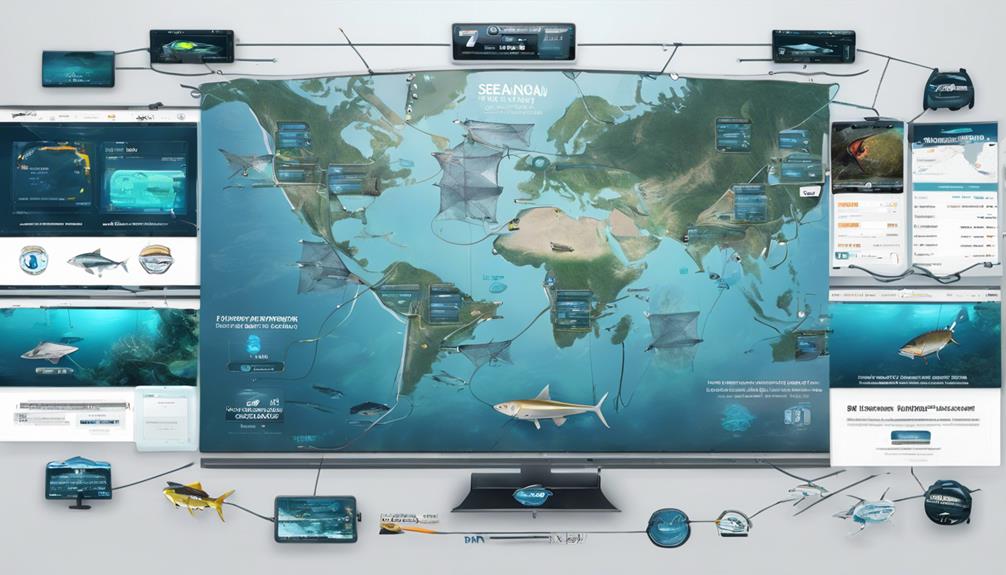
Recent advancements in technology have revolutionized scoring mechanisms in deep-sea fishing tournaments, enhancing accuracy and efficiency in evaluating angler performance. Utilizing AI scoring systems and underwater drones has significantly transformed how competitions are scored, providing a more precise and objective evaluation of participants. Let's delve into the technological advancements shaping the future of deep-sea fishing tournaments:
- AI Scoring Systems: AI technology is being integrated into scoring systems to analyze various factors such as fish species, size, and weight, as well as the time taken to reel in a catch. By automating the scoring process, AI systems can swiftly and accurately determine the angler's performance, reducing human error and ensuring fair competition.
- Underwater Drones: Underwater drones equipped with high-resolution cameras are used to capture the angler's actions beneath the surface. These drones provide live footage of the fishing process, enabling judges to assess techniques, adherence to regulations, and the overall sporting conduct of participants. The use of underwater drones adds a new dimension to scoring by offering real-time insights into angler performance.
- Integration of Data: The data collected by AI scoring systems and underwater drones is seamlessly integrated into a centralized scoring platform. This integration allows for instant calculation of scores based on predetermined criteria, offering spectators and participants immediate feedback on the competition outcomes. By streamlining the scoring process, technology is enhancing the overall experience of deep-sea fishing tournaments.
Inclusivity and Diversity in Tournaments
Advancements in deep-sea fishing tournaments are catalyzing discussions around inclusivity and diversity, prompting a closer examination of participant demographics and equitable opportunities within the competitive fishing community. Accessibility initiatives and community engagement programs have become essential components of modern tournaments, aiming to broaden participation and create a more inclusive environment for all anglers.
Diversity and equity in tournaments are crucial aspects that are gaining traction within the deep-sea fishing community. Efforts to ensure representation from various demographics, including women, minorities, and individuals with disabilities, are being actively pursued. By fostering a culture of inclusivity, tournaments can attract a wider range of participants, enriching the experience for everyone involved.
Incorporating accessibility initiatives such as designated fishing zones for differently-abled anglers, providing specialized equipment, and offering training programs can significantly enhance the inclusivity of tournaments. Community engagement plays a pivotal role in promoting diversity by organizing workshops, seminars, and outreach events to encourage underrepresented groups to participate in competitive fishing.
Ensuring diversity and equity in tournaments not only cultivates a more welcoming atmosphere but also contributes to the overall growth and sustainability of the sport. By embracing inclusivity and providing equal opportunities for all participants, deep-sea fishing tournaments can evolve into more vibrant and dynamic events that celebrate the richness of differences among anglers.
Frequently Asked Questions
How Are Participants Selected for Deep-Sea Fishing Tournaments?
When it comes to deep-sea fishing tournaments, participants are selected through a rigorous selection process based on their qualifications. Various factors like fishing experience, knowledge of the sport, and past performance are taken into consideration.
To ensure a fair and competitive environment, organizers often review applicants' track records and adherence to tournament rules. The selection process aims to gather skilled and dedicated anglers who can showcase their abilities in the challenging deep-sea fishing competitions.
What Safety Measures Are in Place for Participants During Tournaments?
During deep-sea fishing tournaments, safety measures are vital. Emergency protocols ensure swift responses to any unforeseen situations, while medical assistance stands ready to address injuries or health concerns.
These measures aim to safeguard participants throughout the event, providing a secure environment for all involved. Being proactive with safety precautions enhances the overall experience and minimizes risks associated with deep-sea fishing tournaments.
Are There Age Restrictions for Competing in Deep-Sea Fishing Tournaments?
When it comes to deep-sea fishing tournaments, age restrictions often apply to ensure safety and compliance with regulations. Some tournaments may require parental consent for minors to participate.
Additionally, there might be a youth division within the competition, allowing younger anglers to showcase their skills while competing against their peers. These measures not only maintain fairness but also promote a responsible and inclusive environment for all participants.
How Do Organizers Ensure Fair Play and Prevent Cheating in Competitions?
To ensure fair play and prevent cheating in deep-sea fishing tournaments, organizers implement various preventative measures. These measures include strict adherence to rules and regulations, thorough equipment checks, and random inspections.
Participants are expected to uphold ethical conduct throughout the competition. Any violations are promptly addressed and may result in disqualification.
What Measures Are Taken to Protect Marine Life During Tournaments?
When participating in deep-sea fishing tournaments, it's crucial to prioritize marine conservation and sustainability initiatives.
To protect marine life, organizers often enforce strict catch limits, size regulations, and release protocols. These measures help maintain a healthy ecosystem and prevent overfishing of vulnerable species.
Conclusion
In conclusion, the future of deep sea fishing tournaments is poised for significant advancements in technology, sustainability, globalization, diversity, and conservation efforts.
With emerging technologies, sustainable practices, and evolving prize structures, fishing competitions are expected to become more inclusive and environmentally conscious.
As scoring methods continue to advance and women play a more prominent role in tournaments, the deep sea fishing community is moving towards a more diverse, competitive, and responsible future.
